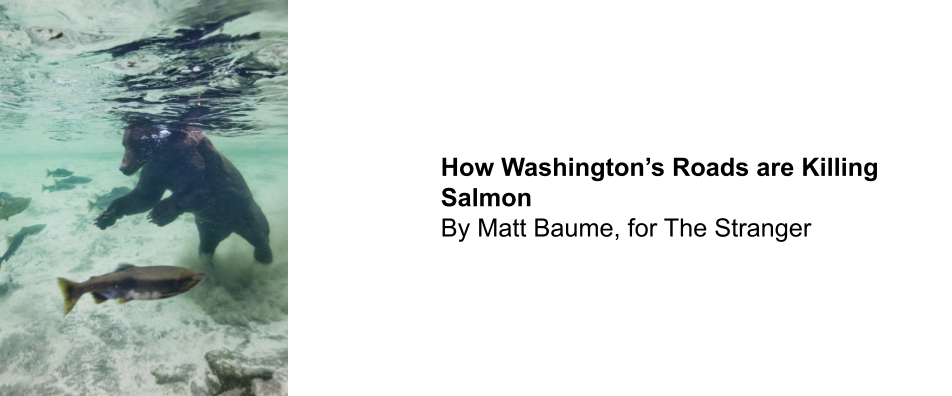The tires of your car have a chemical in them, called 6PPD, that slows tire degradation by binding with oxygen and ozone that could break down the rubber. But these same reactions that protect the rubber are also creating a new chemical, called 6PPD-quinone, which scientists just found in 2020 to be highly toxic to aquatic organisms.
6PPD is in essentially every tire made since the 1960s, and aquatic ecosystems around the world, particularly in dense urban areas, are in danger.
Coho salmon is particularly susceptible to the toxin, and salmon populations in the Seattle area have been decimated by stormwater runoff containing the tiny particles that wear off tires as they speed down the road.
Now that the science is clear, the search is on to find a substitute for 6PPD; but for many years to come, the pollutants will continue to shed from our tires and into our waterways.
How to stop the stormwater from getting to the salmon and other aquatic organisms is one of the many ways that the Puget Soundkeeper Alliance is advocating for the ecological health of Puget Sound and other waterways in the Seattle area.
Sean Dixon leads these efforts as the executive director of the Puget Soundkeeper Alliance, which is part of the worldwide network of waterkeepers.
I discuss with Sean the work he’s doing in Seattle but also the waterkeeper movement more broadly and the importance of organized, community-engaged action to protect waterways and the diverse ecosystems that depend on them across the planet.
This episode of Chrysalis is part of the Chrysalis Projects series. You can listen on Substack, Apple Podcasts, and other podcast platforms.
Please rate, review, and share to help us spread the word!
Sean Dixon
As Executive Director of Puget Soundkeeper, Sean works with the entire Soundkeeper staff team, board, and network of community partners, volunteers, and advocates to drive clean water progress across the Puget Sound and its watershed. As an attorney, entrepreneur, and environmental advocate, Sean has worked for years defending communities and ecosystems from pollution, supporting sustainable fisheries, pushing for climate adaptation and mitigation, and fighting for innovative approaches to solving the myriad threats facing our oceans, coasts, and waterways. Before moving to the PNW, Sean worked as an attorney at Hudson Riverkeeper, a local sustainable seafood fishmonger, and, most recently, as Chief of Staff for the Region 1 (New England) office of the U.S. Environmental Protection Agency.
Sean currently serves as the Publications Officer for the American Bar Association’s Section of Environment, Energy, and Resources, and holds an LL.M. in Climate Change Law and a J.D. in Environmental Law from the Elisabeth Haub School of Law at Pace University, in White Plains, NY, a master’s degree from the Yale School of the Environment, and a B.A. in Marine Biology and Oceanography from Boston University.
Recommended Readings & Media
Credits
This episode was researched by Lydia Montgomery and edited by Sarah Westrich, with additional editing by Isabella Nurt, Amy Cavanaugh, Arthur Koenig, Kate Fair, and Marta Kondratiuk. Music is by Daniel Rodriguez Vivas. Mixing is by Morgan Honaker.















